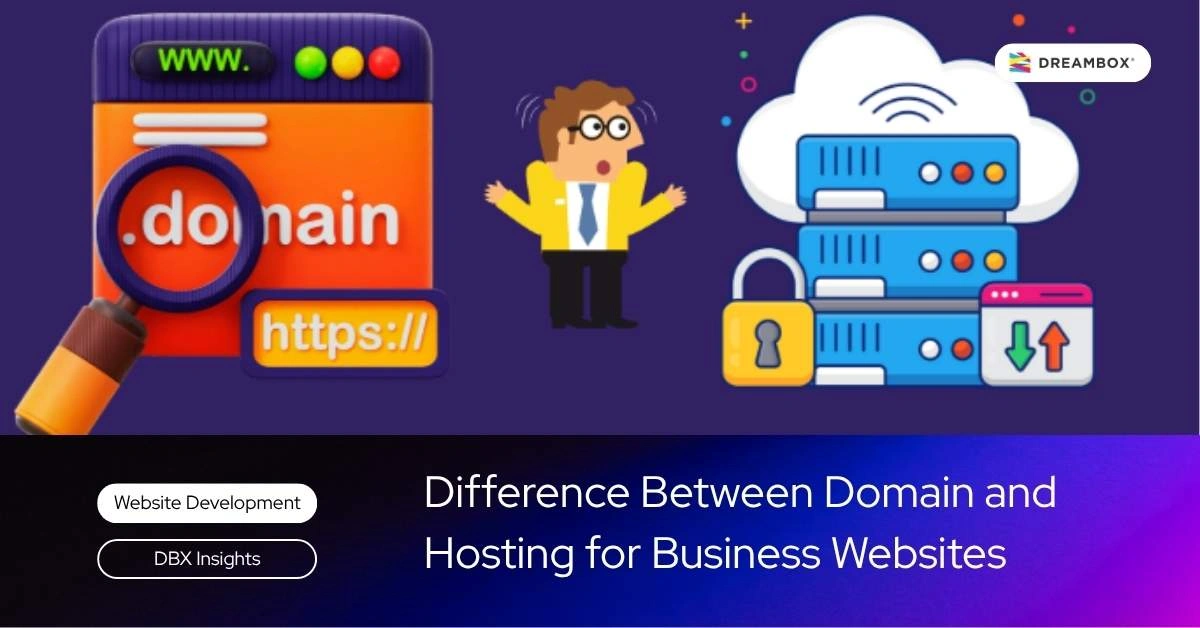The difference between a domain and hosting is often confusing, but the concept is simple using the house analogy. A domain is its unique address (e.g., www.namabisnis.com), while hosting is the physical land where all website data is stored. They connect via DNS (Domain Name System).
Let’s explore this further so you avoid missteps when creating your website.
What is a Domain and Hosting?
A domain is the unique address used to access a website. Examples of domains include google.com and facebook.com.
Meanwhile, hosting is a service that provides space to store a website’s data. Without hosting, a website certainly cannot be accessed.
In short, you need a domain to access a website and you need hosting to display the content of a website.
Schedule a free 30-minute branding consultation session with our experts.
A Simple Analogy: Domain vs. Hosting
A domain acts like a house address, helping people find your website. At the same time, hosting can be likened to a house that can store the website’s contents.
If you already have a domain but don’t have hosting yet, it’s like having someone with your house address, but when they arrive, the house isn’t ready.
The Difference Between a Domain and Hosting
To better understand the difference between these two website elements, let’s examine a comparison of their functions and determine which one you should purchase first.
- Function A domain functions as an address that can help people find your website. Meanwhile, the function of hosting is to store and run the website’s data, making it fully accessible.
- How It Works: A domain directs a user to the website’s address, and hosting provides the website’s content for display.
- When it’s needed, A domain is required when people want to access your website through an easy-to-remember address. Hosting, on the other hand, is required in order to display the website’s content.
- Which Should You Buy First? It’s better to buy hosting first because most hosting packages sold already include a free domain. But, if you are more focused on securing a domain name first, you can buy the domain before later purchasing hosting.
Types of Domain Extensions
Understanding the difference between a domain and hosting also involves recognizing the types of domain extensions. Here are the most common types of domain extensions found on the internet:
1. .com
The most popular type is easy to remember. Suitable for online businesses and blogs.
2. .id
This is the official domain for websites based in Indonesia. It can be the best option for companies or organizations based in this country.
3. .org
It is primarily used by non-profit organizations and social institutions, making the domain name appear more professional.
4. .net
Initially, this domain was primarily used by technology companies, but it’s now commonly used, much like .com.
5. .edu
Used by educational institutions and is usually registered by official educational bodies.
How to Choose the Right Hosting
After understanding the difference between a domain and hosting, ensure you avoid mistakes in choosing a hosting service by following these tips.
1. Match It to Your Website’s Needs
Select a hosting package that suits your website’s specific needs. If you’re a beginner, shared hosting is considered sufficient. But, for a website that already has high traffic, cloud hosting is more recommended.
2. Ensure It Has Maximum Speed
Choose a hosting provider that guarantees maximum server speed. Fast hosting rarely experiences downtime, which improves user experience and optimizes SEO.
3. Match the Bandwidth Capacity
Ensure that you choose a sufficiently large bandwidth capacity, especially if your website receives a high volume of visitors.
4. Check the Support Service
Select a hosting provider that offers 24-hour customer support and is responsive when technical issues arise.
5. Compare Prices and Features
Don’t be easily tempted by low prices. Verify if the hosting provider offers a comprehensive service package, including an SSL certificate (https://), a free domain, and automatic backups.
FAQ About Domain and Hosting
- Do I Need to Buy a Domain If I Already Have a Hosting Service?
Yes. Without a domain, your website cannot be accessed and can only be opened using an IP address, which is hard to remember. - Can a Domain Be Moved to Another Service?
Yes. This is achieved through a domain transfer, which involves moving the management of a domain from one domain provider to another. - Can I Manage a Website Without a Hosting Service?
No. Without hosting, a domain cannot display any content from your website. - Can I Buy a Domain and Hosting Separately?
Yes. This makes your options more flexible, and you can still easily manage the DNS manually.
When you have chosen the right domain, it means you are one step closer to building a solid website. But, sometimes this cannot be done alone, and therefore, some people choose to partner with a professional team.
Need Help Building a Website from Scratch?
Now that you know the differences between a domain and hosting, you can take the first step in building your dream website. If you’re confused about where to start, Dreambox’s Website Development services can be tailored to your needs.
Contact us for service details or read more insightful articles only at DBX Insights!










